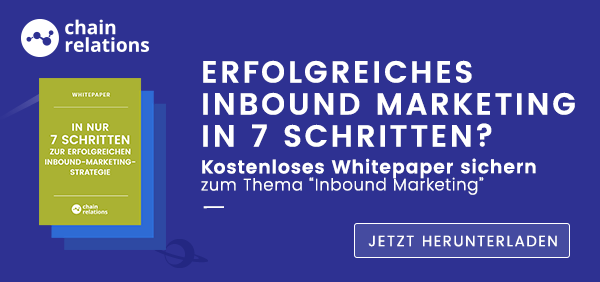Inhaltsverzeichnis
1. Was heißt Inbound Marketing im B2B?
2. Vier Phasen auf dem Weg zum Vertriebserfolg
3. Vertrauensaufbau in der Buyer’s Journey
4. Mit Jobs-to-be-Done verstehen, was Kunden wollen
5. Was sind die Vorteile von Inbound Marketing im B2B-Umfeld?
6. Für welche Unternehmen eignet sich Inbound Marketing?
7. Für wen ist Inbound Marketing geeignet?
1. Was heißt Inbound Marketing im B2B?
Als Marketer in B2B-Unternehmen stehen Sie heute vor einer Herausforderung: Der Entscheidungsprozess Ihrer Kunden – die Buyer’s Journey – hat sich gewandelt.
Entscheidungsträger:innen meiden den Kontakt mit Ihrem Vertrieb und recherchieren selbstständig alle Faktoren, die eine Problemlösung mitbringen sollte. Erst wenn die potenziellen Kunden gut informiert sind, fühlen sie sich bereit für den Austausch mit einem Sales-Team. Sie melden sich dann selbst oder reagieren auf ein Gesprächsangebot.
Die Generierung von qualifizierten Leads, die der Vertrieb zum richtigen Zeitpunkt bearbeiten kann, gewinnt daher an Bedeutung. Hierfür stehen Ihnen mehrere klassische Handlungsoptionen offen.
Ein möglicher Weg ist Inbound Marketing – ein Ansatz, der sich vor allem für B2B Unternehmen eignet, die erklärungsbedürftige Produkte und Dienstleistungen vertreiben. Marketing und Vertrieb arbeiten hier gemeinsam an einem Ziel: Qualifizierte Leads zu generieren, die zu einer Entscheidung fähig sowie bereit sind uns so für Umsatz zu sorgen.
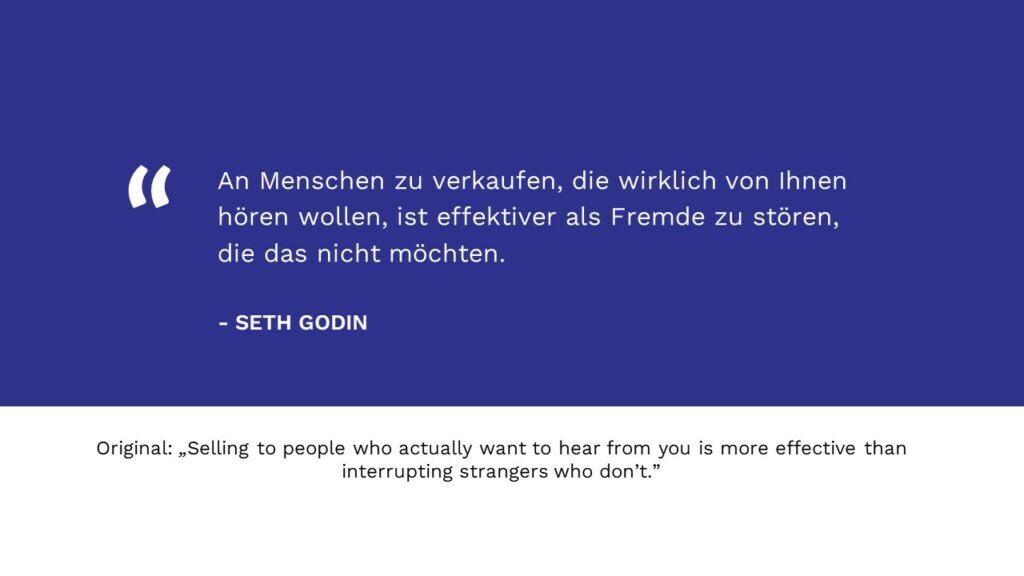
Die Grundprinzipien von Inbound Marketing
Bis Anfang der 2010er-Jahre funktionierte Marketing nach einem typischen Schema: Anbieter schickten ihre Werbebotschaften unaufgefordert an große Zielgruppen, z. B. via Fernsehwerbung, Newsletter, Display Anzeigen, Anrufen nach Feierabend oder Werbebriefen. Ziel der Bemühungen war, eine große Menge an Menschen zu erreichen. Frei nach dem Motto: „Irgendwer beißt schon an“.
Klassische Methoden (oft als Outbound Marketing zusammengefasst) setzen also auf einen Push Mechanismus. Kunden wehren die Werbeflut jedoch zunehmend ab. Vor allem, weil Outbound Marketing in der Regel zum falschen Zeitpunkt kommt. Wenn überhaupt beschäftigen sich ein paar Zielpersonen aktuell mit den beworbenen Produkten oder Dienstleistungen. Der Rest ignoriert Outbound-Botschaften, da sie aktuell keine Relevanz haben. Outbound-Marketing ist somit unwirtschaftlich und nicht nachhaltig ist. Eventuelle Effekte verpuffen innerhalb weniger Tage oder gar Minuten. Und mit ihnen die Budgets.
Aus diesem Grund sind klassische Marketing-Maßnahmen (genauso wie rein Push-bezogenes E-Mail-Marketing) für Sie in vielen Fällen unwirtschaftlich. Zumal Outbound Marketing nicht nachhaltig ist. Seine Effekte verpuffen innerhalb weniger Tage oder gar Minuten. Und mit ihnen die Budgets.
Inbound Marketing wirkt wie ein Magnet
Im Gegensatz dazu verfolgt Inbound Marketing per Definition einen Pull-Ansatz:
- Sie veröffentlichen im Internet Informationsangebote (Advertorials, Anzeigen, Content SEO und virale Verbreitung über Social Media), die den Entscheidungsprozess von potenziellen Kunden erleichtern, und ziehen sie dadurch auf Ihre Webseite.
- Sie positionieren sich bei Ihrer Zielgruppe mit hochwertigen Content (z. B. E-Books, Whitepapers oder Guides) als Informationslieferant – als Download im Austausch gegen deren Kontaktdaten.
- Ihre neuen Leads versorgen Sie kontinuierlich mit weiterem Content (Lead Nurturing). Durch diesen Service entsteht Vertrauen, das im Idealfall die Kaufentscheidung zu Ihren Gunsten beeinflusst.
- Die weiterentwickelten Kontakte überstellen Sie an den Vertrieb, sobald Ihre Leads dies wünschen oder ausreichend Interesse gezeigt haben.
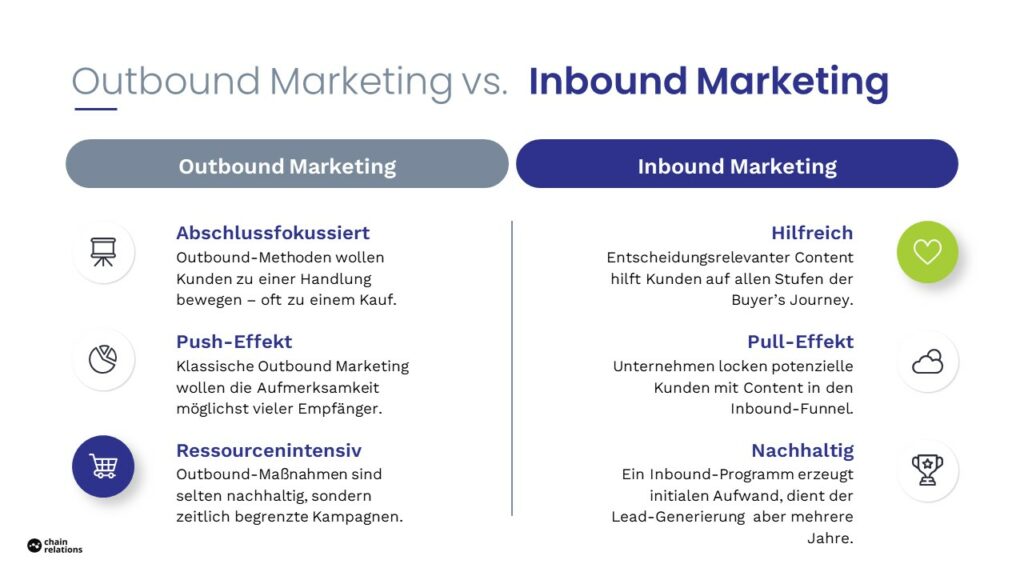
Die Inbound-Methodik umfasst in erster Linie Online-Marketing-Maßnahmen, die Sie auf Ihr Ziel, die Neukundengewinnung und zunehmend auch die Kundenbindung abstimmen. Weichere, schwer messbare Faktoren wie Aufmerksamkeit, Bekanntheitsgrad Ihrer Marke, Generierung von Nachfrage (Demand Generation) oder Branding-Effekte sind positive Begleiterscheinungen. Zugleich können Sie offline gewonnene Leads im Inbound Marketing auf die gleiche Weise wie Online-Leads qualifizieren.
Die Hauptaufgaben von Inbound Marketing
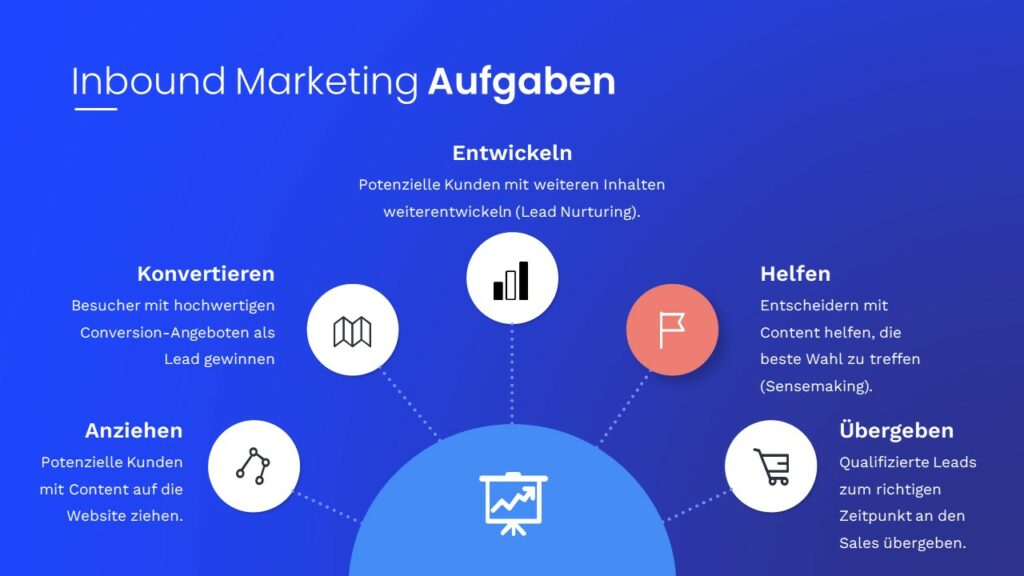
Im Inbound Marketing ist nicht mehr der Vertrieb hauptverantwortlich für die Betreuung potenzieller Kunden, sondern das Marketing nimmt sich dieser Verantwortung ebenfalls an. Um hierbei effizient vorzugehen, automatisiert es die Kontaktpflege mithilfe dedizierter Software-Lösungen.
Diese Marketingstrategie hat zwei Vorteile:
- Sie können wesentlich mehr Interessent:innen bearbeiten als früher.
- Ihr Vertrieb kann sich auf die Kontakte fokussieren, die wirklich ein hohes Interesse an Ihrem Angebot haben. Zudem können sie sich eher darum kümmern, langfristige Kundenbindung aufzubauen.
Inbound Marketing erfüllt als Marketing- und Vertriebsansatz folgende Aufgaben: Potenzielle Kunden
…auf die eigene Webseite ziehen („Pull“).
…zur Registrierung bewegen.
…mit Hilfe hochrelevanter Inhalte weiterentwickeln.
…in ihrer Entscheidungsfähigkeit sowie -bereitschaft voranbringen.
…zum richtigen Zeitpunkt an den Vertrieb übergeben.
2. Lead-Generierung im Inbound Marketing Funnel
Inbound Marketing ist in Phasen unterteilt. Am bekanntesten ist das klassische Vier-Phasen-Modell des US-amerikanischen Software-Anbieters HubSpot:
- Attract (Potenzielle Kunden mit entscheidungsrelevanten Inhalten auf die eigene Webseite ziehen)
- Convert (Anonyme Besucher:innen mithilfe von Download-Angeboten in Leads konvertieren)
- Close (Leads durch Lead Nurturing für den Vertrieb qualifizieren und in Kunden verwandeln)
- Delight (Kunden mithilfe von weiterem Content in begeisterte „Promoter“ des eigenen Unternehmens verwandeln).
Die HubSpot-Gründer Brian Halligan und Dharmesh Shah entwickelten den Ansatz und nutzten den Begriff Inbound Marketing Anfang der 2000er Jahre als Erste. Inzwischen verwendet HubSpot sein Flywheel, um die Kundengewinnung und -bindung bestehender Kunden während des Customer Lifecycle (CLV) zu strukturieren. In dieser Abhandlung verwenden wir das klassische Modell, da es für Einsteiger leicht nachvollziehbar ist.
Einmal aufgebaut generiert der Ansatz qualifizierte Leads. Ein entscheidender Vorteil ist, dass Ihre Lead Generation Programme praktisch kaum veralten, so dass die Elemente des Inbound Marketing Funnels langfristig effizient einsetzbar sind.
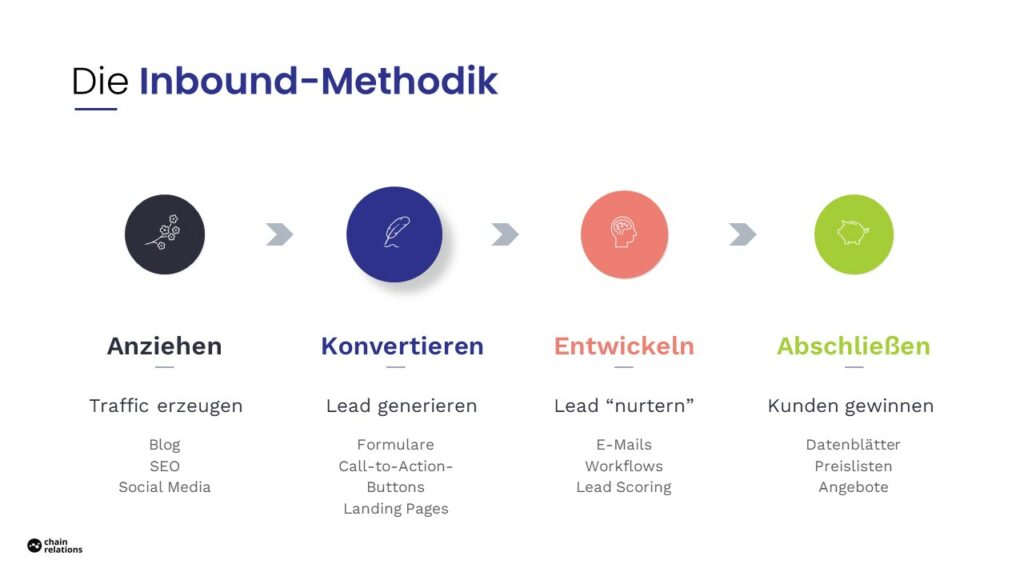
Phase 1: Traffic anziehen
So gut wie jede Entscheidung für komplexe Produkte oder Dienstleistungen – vor allem im B2B-Bereich – beginnt heute bei einer Suchmaschine. Kunden recherchieren intensiv und bewerten Alternativen eigenständig. Sie vermeiden Gespräche mit Ihrem Vertrieb und wehren Besuche ab.
Zunächst müssen Sie also Aufmerksamkeit aufseiten Ihrer Zielgruppe erzeugen. Nach dem Pull-Prinzip heißt das: Wenn der Kunde seine Kaufentscheidung vorbereitet, muss er Sie und Ihre Inhalte finden.
Auf entscheidungsrelevante Informationen stoßen potenzielle Kunden vor allem über Suchmaschinen, bei Medien oder Analysten – und auf Ihrer Website sowie auf denen der Wettbewerber. Weitere Quellen sind Social-Media-Plattformen, persönliche Kontakte und Diskussionsforen, Konferenzen und inzwischen auch Podcasts.
Für die erste Phase im Inbound Marketing müssen Sie vor allem folgende Marketing-Maßnahmen auf- und ausbauen sowie koordinieren:
- Suchmaschinenoptimierung (SEO), insb. Content SEO
- Blog
- Public Relations (PR)
- Performance Marketing über
- Suchmaschinen (SEM/SEA)
- Social-Media-Marketing
- Native Advertising bzw. Advertorials
Auch Online-Anzeigen – Bannerwerbung, aber insbesondere Google Ads und Retargeting – eignen sich für die erste Phase im Inbound-Marketing. Beim Retargeting (und bei einigen Formen des Native Advertisings) werden Sie von den Anzeigen eines Unternehmens „verfolgt“, nachdem sie dessen Website besucht haben. Interessiert sich ein potentieller Kunde für Ihre Inhalte, klickt er auf den entsprechenden Link oder besucht im nächsten Schritt Ihre Website erneut. Dies tut er auf eigenen Wunsch und aufgrund seines Status im Entscheidungsprozess.
In der ersten Phase im Inbound Marketing genießt Ihre Website besondere Aufmerksamkeit. Sie ist das Spielfeld, auf dem der Großteil der Aktivitäten stattfindet. Dieses Spielfeld sollten Sie so schnell wie möglich für Ihr digitales Marketing optimieren (Usability, Design, Funktionalität etc.).
Unternehmen, die Inbound-Marketing neu einführen, sollten Schritt für Schritt vorgehen. Wenn Sie sehr schnell eine Vielzahl an Baustellen eröffnen, verlieren Sie leicht den Überblick. Daher empfiehlt es sich, Aufgabenbereiche zu priorisieren und Stück für Stück abzuarbeiten.
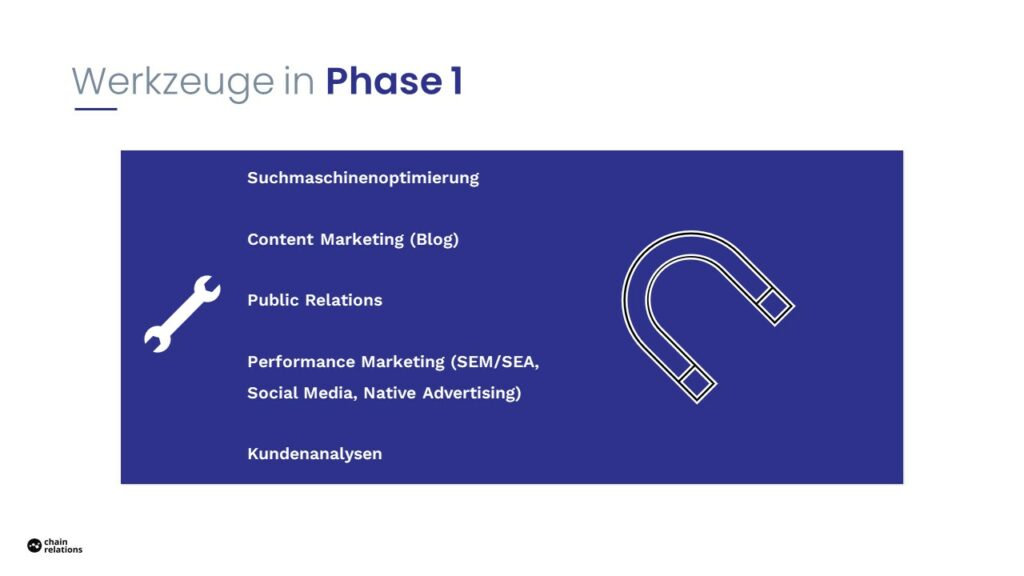
Phase 2: Besucher konvertieren
Die Conversion vom Visitor zum Lead erfolgt im Inbound Marketing, wenn jemand sich in einem Formular auf einer Ihrer Landing Pages registriert. Dabei handelt es sich um eine speziell eingerichtete Seite, die meist keine Navigation besitzt, damit sich der User auf die Registrierung konzentriert. Dabei gibt es einen Deal: Sie ermöglichem einem Interessenten, sich ein hochwertiges Content-Angebot herunterzuladen und im Gegenzug seine Kontaktdaten zu hinterlassen – Name, E-Mail-Adresse, Arbeitgeber, Position im Unternehmen etc. Denkbar sind zum Beispiel Whitepaper, E-Books, hilfreiche Listen, Webinare oder andere redaktionelle Inhalte.
In der zweiten Phasen des Inbound Marketings kommen folgende Bausteine Ihrer Webseite zum Tragen:
- Hochwertige Download-Angebote
- Call-to-Action-Buttons
- Landing Pages
- Formulare
- E-Mails mit Download-Links
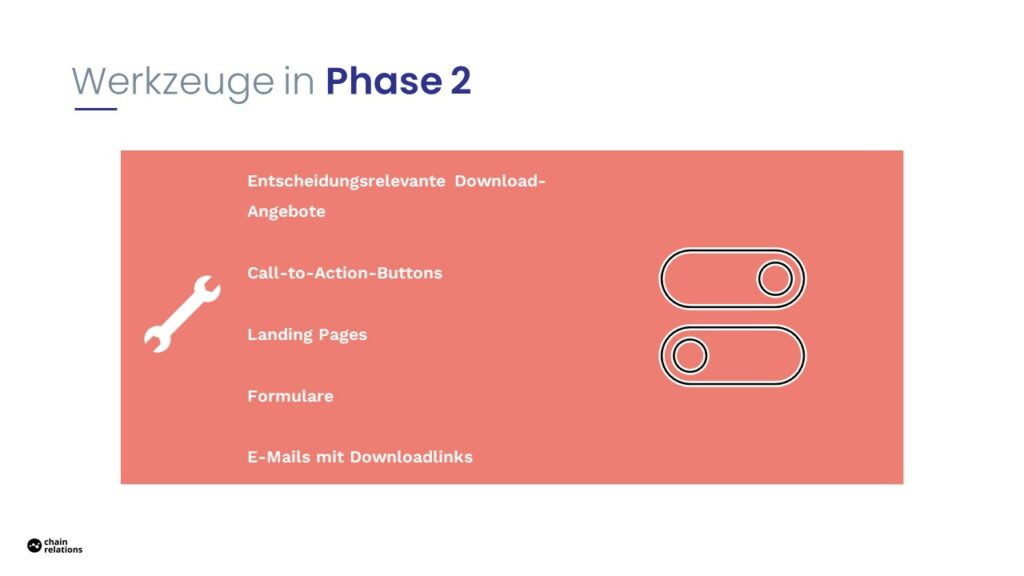
Phase 3: Leads entwickeln
Meistens ist ein Kontakt nach dem ersten Download noch weit von einer Entscheidung entfernt – von einem Kontakt mit Ihrem Vertrieb ganz zu schweigen. Es sei denn, der potenzielle Kunde äußert ein klares Interesse an einem Gespräch; z. B. indem er ein Assessment oder eine Produktdemo anfragt.
Ruft Ihr Vertrieb trotzdem schon an, passiert leicht genau das, was der Lead unbedingt vermeiden will: Er kann die wichtigsten Aspekte seiner Entscheidung noch nicht beurteilen, aber Ihr Sales bearbeitet ihn bereits oder drängt ihn sogar zu einem Abschluss. Das ist in der Regel kontraproduktiv und führt dazu, dass die Person sich von Ihrem Unternehmen bis auf weiteres fern hält.
Kunden qualifizieren
Deshalb erfolgt in dieser kritischen Phase das Lead Nurturing. Am besten versteht man dessen Relevanz, wenn man sich die deutsche Übersetzung des Begriffs „Nurturing“ vor Augen führt: „To nurture“ bedeutet so viel wie „nähren“ oder „aufziehen“.
Im Prinzip geschieht genau das: Mit Hilfe relevanter Inhalte „nähren“ Sie den Wissens- und Informationsstand des Kontaktes, sprich: Sie entwickeln ihn weiter. In dieser Phase beantwortet sich der potenzielle Kunde selbstständig seine Fragen und so baut er Vertrauen auf. Dazu nutzen Sie Ihren Content mit Ihren Informationen. Früher hätten diese Leads ihren Wissensbedarf nicht eigenständig decken können. Nun erschließen sie sich neue Alternativen oder verwerfen alte. Sie beschreiben ihre Anforderungen, verändern den Umfang der Lösung oder entwickeln neue Präferenzen.
Die wichtigsten Werkzeuge des Lead Nurturings sind:
- Automatisierte E-Mails je nach Entscheidungsphase
- Persönliche E-Mails des Vertriebsmitarbeiters
- Social-Media-Messages je nach Entscheidungsphase
- Weiterer Content mit entscheidungsrelevanten Informationen
- Download-Buttons auf der Webseite, die persönlich passende Content-Dokumente bewerben
- Dynamische Inhalte auf der Webseite
- Retargeting mit individuellen Angeboten
- Interne Benachrichtigungen über Interaktionen von qualitativen Leads
Vorteilhaft ist, wenn der Vertrieb ab einem bestimmten Qualifizierungslevel eines Leads immer auf dem Laufenden gehalten wird. Was lädt der potentielle Kunde herunter? Wie interagiert er mit Ihrem Inbound Marketing? So können sich Marketing und Sales gemeinsam auf geeignete Nurturing-Maßnahmen abstimmen.
Eine Alternative zum Lead-Nurturing bilden inzwischen sogenannte Content Hubs bzw. Learning Center, d. h. Bereiche auf der Website, in dem Content so strukturiert wird, dass Etscheider:innen sich alle ihre Fragen nacheinander beantworten, sich also sozusagen weiterbilden können, da die Seite sie durch den Rechercheprozess führt. Bei der Konzeption geht man meist nach dem “They-Ask-You-Answer”-Prinzip vor, das der Marketingberater Marcus Sheridan in seinem gleichnamigen Buch vorgestellt hat.
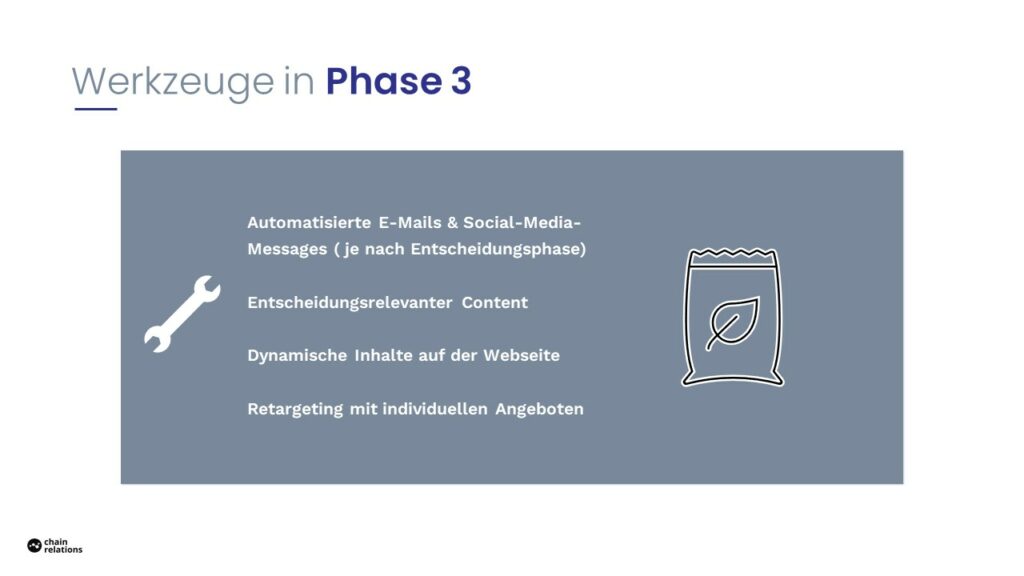
Phase 4: Kunden abschließen
In der letzten Phase übergeben Sie qualifizierte Leads an Ihren Sales. Den genauen Zeitpunkt bestimmen Sie im Vorfeld gemeinsam in Ihrem Marketing- und Vertriebsteam. Maßgeblich dafür ist ein Punktewert (Lead Score), den Sie einem Interessenten im Rahmen des Nurturing-Prozesses zugewiesen haben.
Beim Lead Scoring geben Sie jedem Kontakt ein Punkte-Profil. In diesem verzeichnen Sie jede Aktion, die diese Person im Zusammenhang mit Ihrem Content- und Nurturing-Angebot tätigt. Bewertet werden diese Aktionen anhand eines Punkteverfahrens: Lädt der Lead ein Whitepaper herunter, können Sie ihm dafür z. B. zehn Punkte zuweisen. Umgekehrt kann er auch wieder Punkte verlieren – etwa wenn er längere Zeit nicht auf Ihre E-Mails reagiert. Erreicht der Kontakt einen festgelegten Schwellenwert, ist er bereit für Ihren Vertrieb. Er wird zum Sales-qualified Lead (SQL).
Der Vertrieb kommt mit ins Boot
Ihr Vertrieb betreut den Kontakt ab diesem Zeitpunkt aktiv und nimmt den direkten Kontakt auf – das „OK“ des potenziellen Kunden vorausgesetzt. Dazu erhält er vom Marketing alle Informationen zu den bisherigen Interaktionen:
- Motiv: Über welche Keywords kam er auf Ihre Webseite?
- Engagement: Wie intensiv hat er sich mit dem Content-Angebot und der Webseite beschäftigt?
- Interesse: Was hat er angeschaut/heruntergeladen?
- Rolle im Entscheidungsprozess: Welche Angaben hat er in den Formularen gemacht?
Die Kontaktaufnahme kann nun auf drei Arten erfolgen:
- Der Lead setzt online ein klares Signal (z. B. Anruf erbeten, persönliche Demo bestellt, Assessment vereinbart).
- Sie entwickeln ihn derart gut, dass das Entscheidungsgremium (Buying Center oder Buyer Group) Sie einlädt. Die Mitglieder dürften sich einen ausreichenden Wissenstand aufgebaut haben und über die meisten Parameter relativ gut Bescheid wissen.
- Der Kontakt wird von Ihnen gezielt angesprochen – per E-Mail oder telefonisch. Dazu sollten Sie ein paar Interaktionen von Seiten des Kontakts abwarten, damit er Sie bzw. Ihr Unternehmen kennt und sich nicht von der unerwarteten Kontaktaufnahme überrumpelt fühlt. Zudem sollten Sie ein aussagekräftiges Profil Ihres Gesprächspartners aufgebaut haben.
Idealerweise geschieht spätestens in dieser Phase die Übergabe des Leads im CRM-System. Dort sieht der Vertriebsmitarbeiter die gesamte Historie in seiner vertrauten Umgebung. Zudem kann er erkennen, welche anderen Kontakte beim potenziellen Kunden bekannt sind oder ob dessen Unternehmen schon einmal etwas von Ihnen gekauft hat.
Wichtige Komponenten in dieser Phase sind:
- Content-Angebote, die ein hohes Kaufinteresse voraussetzen, z. B. Assessments oder Produktdemos.
- Sales Enablement: Sie geben Ihrem Vertrieb die nötigen Informationen und Tools an die Hand, sodass die Buyer’s Journey des Kunden nicht durch den Übergang von Marketing zum Sales beeinträchtigt wird. Ihr Vertrieb kann genau da weitermachen, wo Ihr Marketing aufgehört hat.
- Lead Routing, die technische Übergabe an einen Vertriebsmitarbeiter oder -partner, sobald der potentielle Kunde qualifiziert genug ist.
- Integration von Marketing-Automation- und CRM-System, so dass die Daten zwischen den Systemen automatisch ausgetauscht werden.
Wenn potenzielle Kunden Sie während der Vorbereitung nicht auf die Short-List setzen, ist die Chance auf den Abschluss verpasst. Im positiven Fall jedoch treffen Ihre Verkäufer:innen auf sehr gut informierte Entscheidungsgremien. Allgemeine Produktpräsentationen und Grundlagen sind nun fehl am Platz. Es geht um die letzten Entscheidungsparameter, um einige Einwände sowie letzte Fragen und natürlich um Konditionen und Preise.
Ihr Vertrieb kann sich also Cold Calls und den einen oder anderen Produktpräsentationstermin sparen. Er darf sich mit B2B-Entscheider:innen beschäftigen, die entscheidungsfähig sind und wirklich kaufen wollen. Dazu kann der Vertrieb sich im Kundengespräch mehr auf die Bedürfnisse seines Gegenübers statt auf die Vorzüge seines Produktes konzentrieren.
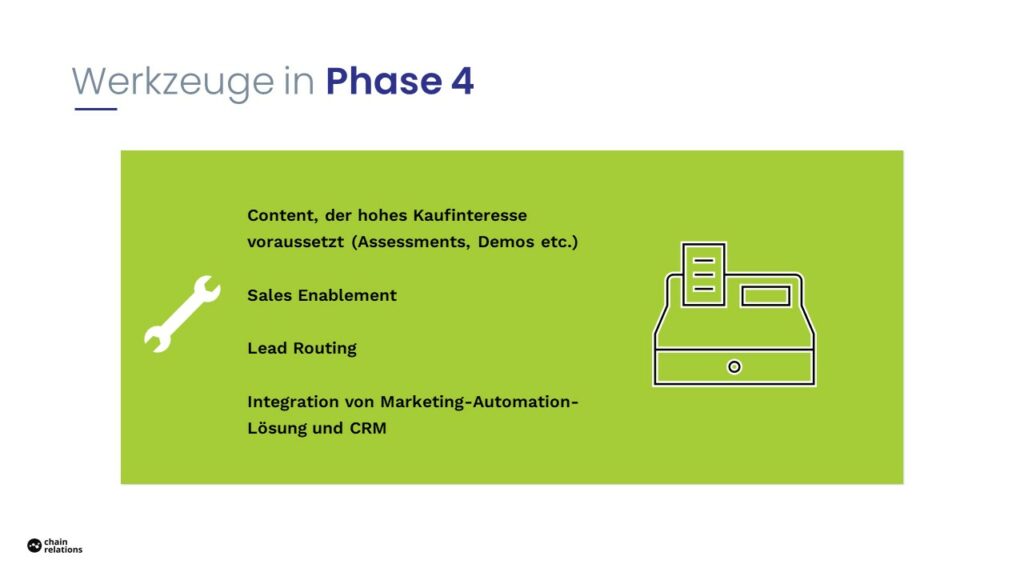
3. Content Marketing: Vertrauensaufbau in der Buyer’s Journey
Sie müssen heute nicht nur erstklassige Produkte, Dienstleistungen oder Lösungen anzubieten. Sie müssen sich auch als guter Informationslieferant für den Entscheidungsprozess Ihrer Kunden beweisen. Nur so können Sie am Ende den Abschluss machen und nachhaltigen Erfolg erzielen.
Dazu müssen Sie relevanten Content anbieten:
- Als erstes ziehen Sie einen potenziellen Kunden mit interessanten Inhalten auf Ihre Website und bewegen diesen dort zu einem Download, seiner ersten Registrierung.
- Anschließend unterstützen Sie ihn auf jeder Stufe seines Entscheidungsprozesses mit weiterem Content und fördern so seine Bereitschaft sowie die Fähigkeit, sich zu entscheiden.
Dies geschieht im Rahmen der drei Phasen des Entscheidungsprozesses:
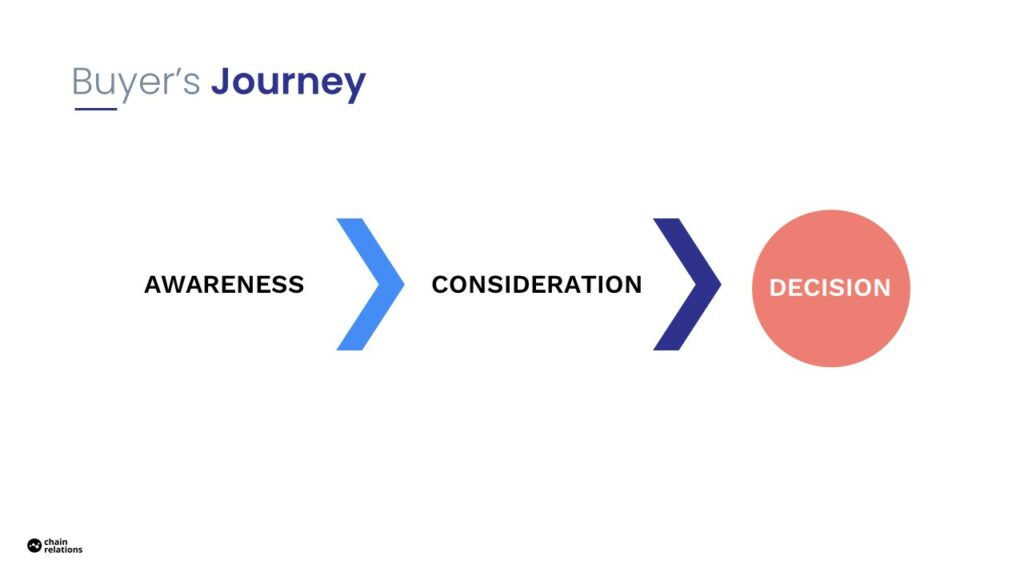
1. Awareness- bzw. Erkenntnisphase
Der Kunde steht vor einem Problem oder einer Herausforderung und realisiert, dass er Lösungsbedarf hat. Er beginnt mit der Suche nach passenden Informationen. Da ihm sein Problem und mögliche Lösungsansätze noch nicht ganz klar sind, ist diese Suche noch sehr ungezielt.
2. Consideration- bzw. Bewertungsphase
Der Kunde hat sein Problem erkannt, bewertet verschiedene Lösungsansätze und vergleicht diese untereinander. Am Ende grenzt er mögliche Produkte und Anbieter ein und bildet eine Shortlist, in die die geeigneten Kandidaten aufgenommen werden.
3. Decision- bzw. Entscheidungsphase
In der Entscheidungsphase geht es darum, diese Kandidaten konkret zu überprüfen. Schließlich kann es passieren, dass im Direktkontakt mit den Anbietern nochmal zusätzliche Entscheidungskriterien aufkommen oder allgemeine Informationen sich als unzutreffend für die eigene Situation erweisen. Am Ende entscheidet sich der Kunde für eine konkrete Lösung (und manchmal auch für den Status-Quo).
Inbound Marketing funktioniert, indem Sie während dieser Phasen Vertrauen aufbauen und die Beziehung mit dem potenziellen Kunden fördern. So arbeiten Sie sich in den Kreis der eingeladenen Anbieter vor. Technische Basis dieses schrittweisen Informationsprozesses sind Ihre Website sowie Marketing Automation.
Wie verwalten Sie Ihren Content?
Technische Basis für Ihr Content Marketing ist ein Content Management System (CMS). Hierfür gibt es kostenfreie Plattform-Lösungen wie WordPress oder TYPO3, mit denen sich auch ohne gigantische Ressourcen Websites erstellen und optimieren lassen. Eine Alternative vieten Software-as-a-Service-Plattformen für Websites, wie das HubSpot CMS oder chocoBRAIN.
4. Mit Jobs-to-be-Done verstehen, was Kunden wollen
Vertrauen entsteht im Inbound Marketing essenziell durch Einfühlungsvermögen. Um Lead Management nach dem Pull-Prinzip professionell betreiben zu können, benötigen Marketer sehr viel Wissen über Zielmärkte. Sie müssen verstehen,
- welche Herausforderungen typisch sind für die Branche(n) Ihrer Kunden,
- welche Probleme sie lösen wollen,
- was für Fragen sich für sie in Bezug auf das Angebot Ihres Unternehmens stellen,
- welche Ziele sie während der Customer Journey verfolgen
- und wie sie ihre Kaufentscheidungen treffen.
Ohne dieses Wissen ist es schwierig, Content, Ansprachen und Botschaften zu entwickeln, die Leads während ihrer Buyer’s Journey von einem Anbieter erwarten. Dann investieren Sie Ressourcen in Inhalte, für die Ihre Zielkunden sich nicht interessieren.
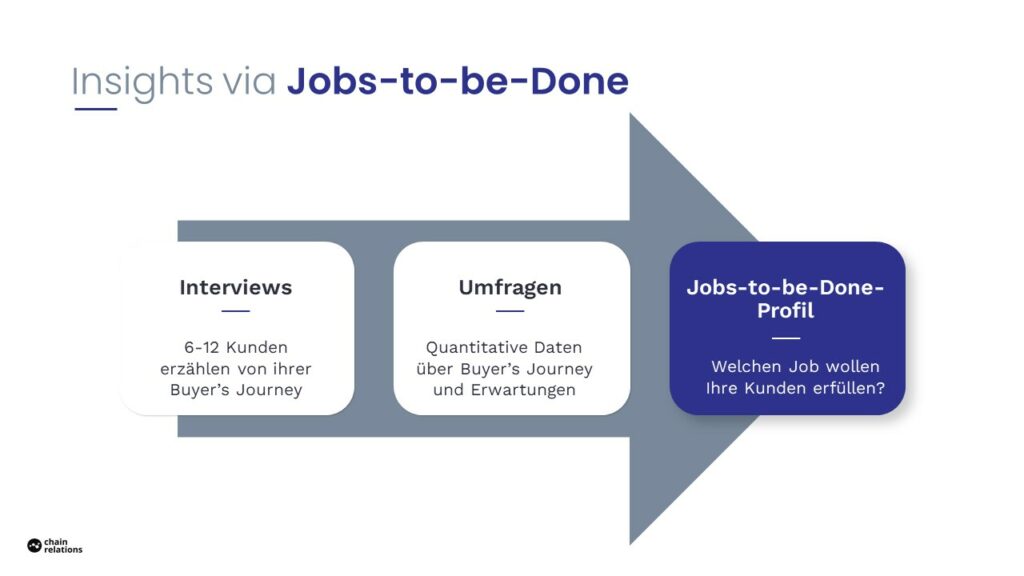
Aus diesem Grund zählen Jobs-to-be-Done-Analysen zum Fundament jeder guten Inbound-Marketing-Strategie. Dazu müssen Sie Ihre Idealkunden befragen, die sie nach dem Schema des Ideal Customer Profile bestimmen.
Was ist Jobs-to-be-Done?
Jobs-to-be-Done ist ein strategischer Ansatz aus dem Bereich der Innovationstheorie, der sich im Gegensatz zu klassischer Marktforschung nicht auf Kunden oder Produkte fokussiert, sondern auf die Erfüllung einer Aufgabe. Im Mittelpunkt steht die Frage, warum Kunden ein bestimmtes Produkt oder eine Dienstleistung kaufen und was sie damit erreichen wollen. Dieses Wissen wird anhand von Online-Fragebögen sowie qualitativen Interviews mit Kunden eingeholt. JTBD ist ein alternativer Ansatz zum Buyer Persona Konzept, wobei sich die Erkenntnisse auch ergänzen können
Wichtig für das Verständnis der Methode ist der Begriff „Job“. Bei JTBD versteht man darunter keine einfache Arbeitsaufgabe. Stattdessen meint der Begriff den Fortschritt, den ein Kundenunternehmen mit einem Produkt oder einer Dienstleistung in seiner individuellen Situation erreichen möchte. Es handelt sich um einen dynamischen Prozess, der unter bestimmten Umständen zu einem konkreten Endergebnis führen soll. Dieses übergeordnete Ziel, das eine oder mehrere Personen im Kundenunternehmen erreichen wollen, ist grundsätzlich lösungsneutral. Schließlich ist dem Kunden egal, auf welchem Weg er es erreicht. Das Angebot des Anbieters ist lediglich ein Weg unter vielen. Diese Kunden-Insights spiegeln dann die Erfahrungen und Daten aus den Customer Journeys idealer Kunden wider und dienen so als Leitgerüst für das Content Marketing.
Darüber hinaus umfasst der Job eines Kunden nicht nur funktionale Aspekte. Wer einen Sportwagen kauft, will z. B. nicht einfach nur von A nach B kommen, sondern verbindet mit dem Fahrzeug emotionale (Freiheit, Stolz etc.) und soziale (Außendarstellung etc.) Bedürfnisse. Diese gilt es im Rahmen der Interview-Führung herauszufiltern.
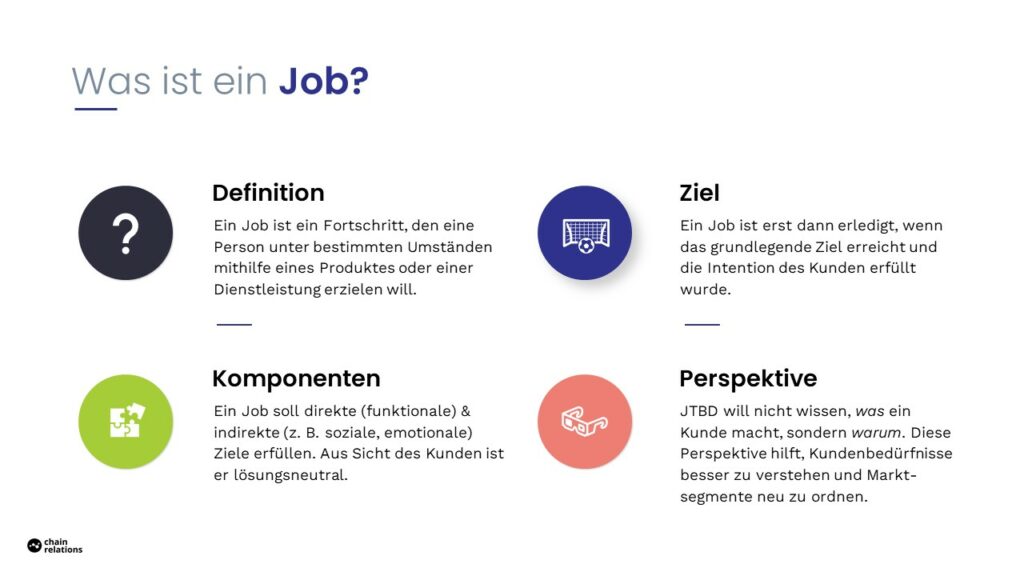
5. Was sind die Vorteile von Inbound Marketing im B2B-Umfeld?
Vorteil 1: Sie erhalten hochqualifizierte Leads
Jeder, der sich für Ihren Content registriert, viele E-Mails öffnet und die Website regelmäßig besucht, ist mit einer gewissen Wahrscheinlichkeit an einem Kauf interessiert. Da Sie diese Interaktionen mithilfe von Software-Lösungen genau verfolgen, können Sie den Reifegrad Ihrer Leads beim Inbound Marketing präzise analysieren.
Nun zu Ihrem Vorteil: Wenn der Kunde schon keine Lust auf Verkäuferbesuche hat und sich eigenständig online informiert – dann doch bitte anhand Ihres Contents. Sie erkennen früh sein Interesse, bauen Vertrauen auf und wissen, wann er entscheidungsfähig und -bereit ist. Und Sie erhalten eher eine Einladung als Unternehmen, mit denen der Lead bislang noch nichts zu tun hatte.
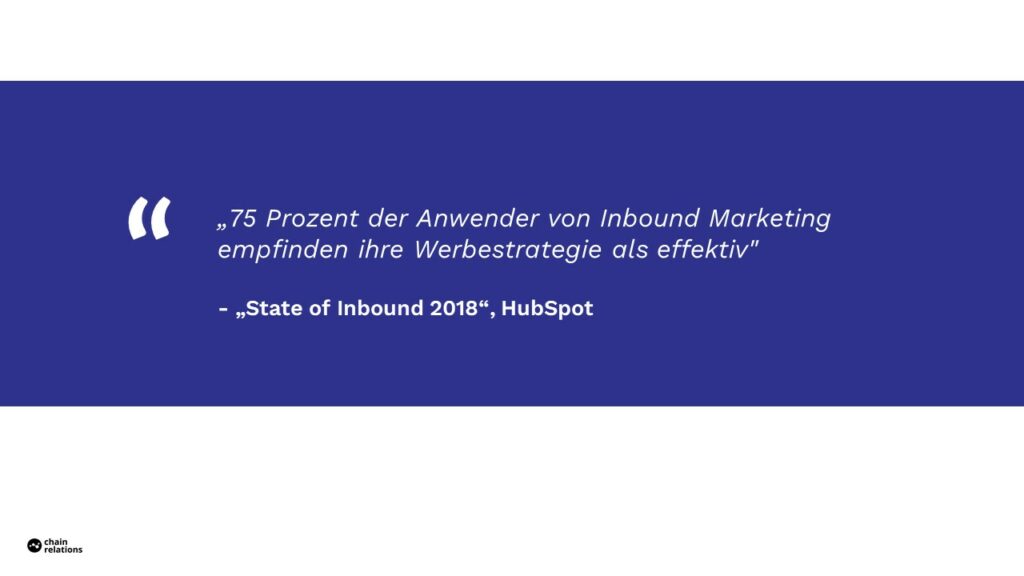
Vorteil 2: Sie entfachen keine teuren Strohfeuer
Sie bauen sich eine Lead-Generierungs-Maschine auf: Jeder Text, jede Landingpage, jeder Prozess, den Sie definieren, wirkt langfristig für Ihren Erfolg. Im Inbound Marketing veraltet fast nichts, so dass die Touchpoints mit Ihren Inhalten immer mehr zunehmen. Jede neue Maßnahme ist eine Ressource, die dauerhaft bei der Neukundengewinnung hilft.
Vorteil 3: Marketing & Sales bearbeiten den Markt gemeinsam
Marketing und Vertrieb haben viel zu lange aneinander vorbei gearbeitet und sich gegenseitig den schwarzen Peter zugeschoben. Im Inbound Marketing definieren die Kolleg:innen aus beiden Bereichen gemeinsam, was ein qualifizierter Kontakt ist, und arbeiten konsequent daran, diesen Lead als zufriedenen Kunden zu gewinnen. Inbound Marketing überwindet also die Kluft zwischen Marketing und Vertrieb.
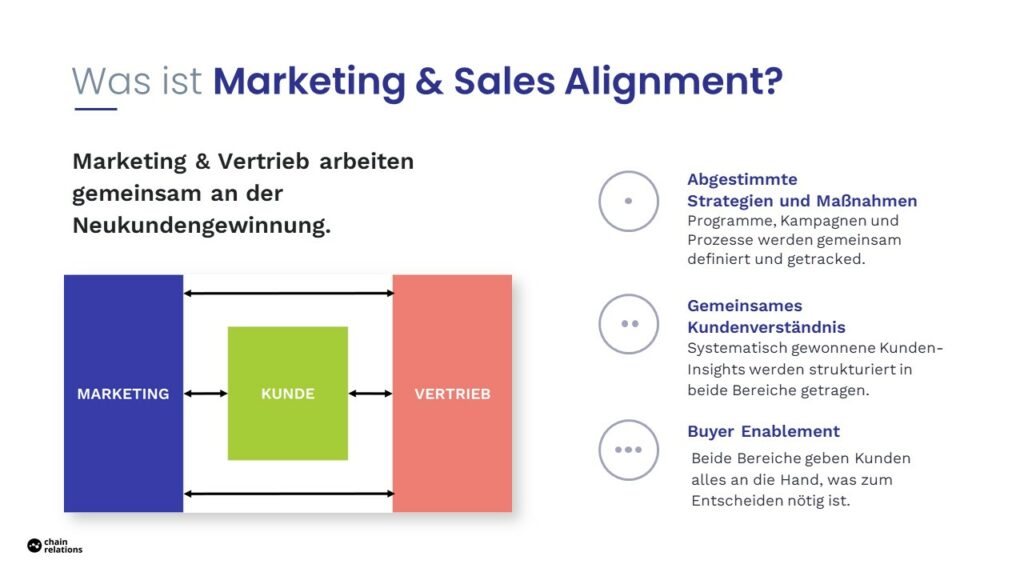
Vorteil 4: Ihre Website wird sichtbar und auffindbar
Der Algorithmus hinter den Suchmaschinen vergleicht, vereinfacht gesagt, Ihren Content mit den eingegebenen Keywords oder Keyword-Kombinationen. Je höher die Qualität Ihrer Inhalte, desto eher erhalten Sie auch den gewünschten Traffic.
Hochwertige Inhalte schlagen sich nicht nur in starken Rankings der Suchmaschinen nieder. Zugleich steigen die Aufenthaltsdauer Ihrer Webseiten-Besucher:innen sowie deren Klickrate auf Folgeseiten. Im besten Fall verlinken Leser Ihre Inhalte und sorgen dadurch für kostenloses Marketing. Darauf zielen auch Social-Media-Kanäle wie Facebook, LinkedIn oder XING mit ihren Publishing-Möglichkeiten sowie werblichen Angeboten ab. Sie erhöhen auf diesem Kanal die Reichweite Ihrer Botschaften.
Vorteil 5: Ihr Content hat hohe Entscheidungsrelevanz
Ihre potenziellen Kunden müssen Ihre Produkte und Lösungen in allen Details verstehen. Sie unterstützen diesen Prozess mit werthaltigem Content.
Oberflächliche Werbeaussagen rufen meistens Misstrauen hervor. Schließlich kann jeder auf seiner Plattform behaupten, sein Angebot sei das Beste und seine Kompetenz unübertroffen. Content, z. B. ein Whitepaper, wird für einen Entscheider erst dann hochrelevant, wenn Sie die Inhalte konsequent auf seine Perspektive und Motive, auf sein Problem oder seinen Bedarf ausrichten.
Zudem berücksichtigt guter Content die jeweilige Phase der Buyer‘s Journey und beantwortet die drängenden Fragen, die sich Interessenten und Kunden stellen. Der potenzielle Kunde erschließt sich anhand dieses Contents,
- was eine Entscheidung für ihn bedeutet,
- welche Alternativen bestehen (Stichwort Sense Making) und
- welche Vorteile und Konsequenzen Ihr Angebot für den Entscheider und das Unternehmen hat.
Granulares Content Marketing, das auf die Motive Ihrer potenziellen Kunden aus unterschiedlichen Branchen abzielt, ist nicht nur objektiv nützlicher. Er ist zudem glaubwürdiger, vermittelt Empfänger:innen ein Gefühl von Sicherheit und schafft Präferenzen im Auswahlprozess. So steigert Inbound Marketing schrittweise die Fähigkeit und Bereitschaft eines Leads, seine Wahl zu treffen.
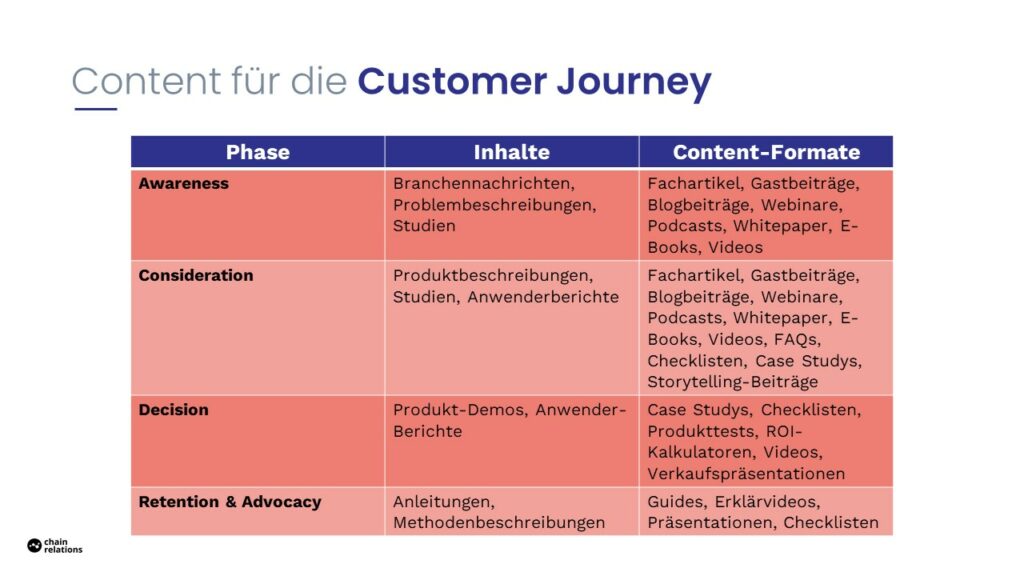
Vorteil 6: Gäste konvertieren zu Leads
„Registrieren gegen wertvollen Content“, so lautet der Deal, mit dem die Beziehung zwischen dem potenziellen Kunden und Ihnen beginnt. Damit gelingt es Ihnen, anonyme Webseiten-Besucher:innen in Leads zu konvertieren.
Inbound Marketing führt zu qualifizierten Leads – und das zumeist in höherer Zahl als klassische Ansätze. Durch die systematische Qualifizierung im Lead Nurturing ergibt sich eine höhere Abschlussquote, da Ihr Vertrieb viele relevante Informationen über diesen Kontakt erhält und dadurch viel stärker auf dessen Herausforderungen und Bedürfnisse eingehen kann.
Vorteil 7: Ihr Marketing-Konzept wird messbar und wirtschaftlicher
Inbound Marketing macht die Performance und den Erfolgsbeitrag aller Aktivitäten für Sie transparent und lückenlos messbar. Mit diesem Wissen können Sie Ihre Inbound-Marketing-Maßnahmen, Landing Pages, Content-Bausteine sowie Übergabezeitpunkte von Marketing an Vertrieb optimieren (Closed Loop Marketing). Außerdem fällt es Ihnen wesentlich leichter, Budgets und Vertriebsressourcen qualifizierten Leads zuzuteilen.
Inbound Marketing bündelt, synchronisiert und ergänzt bestehende Online-Marketing-Instrumente entsprechend ihres Ergebnisbeitrags. Sie erreichen Ihre Marketing-Ziele wirtschaftlicher und effektiver.
Eine höhere Marketing-Effizienz, ein verbesserter Ressourceneinsatz durch Marketing Automation sowie eine höhere Zahl an qualifizierten Leads mit einer beginnenden Präferenz für Ihr Unternehmen führen zu einer deutlich höheren Konversionsrate. Dazu sinken die Kosten für die Kundengewinnung.
Vorteil 8: Inbound Marketing trifft Entscheidungszeitpunkt und -dauer
Im Inbound Marketing verfolgen Sie sämtliche Interaktionen eines Leads. Das ermöglicht es Ihnen, sein Verhalten den drei Phasen der Buyer‘s Journey zuzuordnen und ihn zum richtigen Zeitpunkt mit einem passenden Angebot zu adressieren. Die Folge: Sie verkürzen den Zeitraum, den eine Buyer Group benötigt, um die Buyer‘s Journey zu durchlaufen.
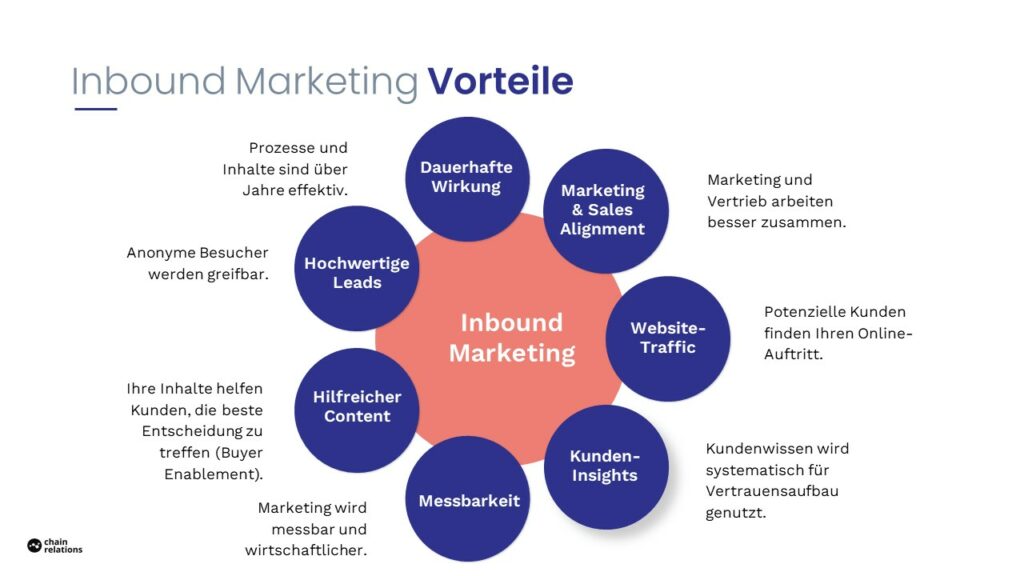
6. Für welche Unternehmen eignet sich Inbound Marketing ?
Unternehmen, die von diesen und weiteren Vorteilen profitieren, erfüllen dafür eine Reihe von Voraussetzungen. Aus unserer Sicht gibt es sieben Kriterien, die erfolgreiche Inbound-Anwender auszeichnen:
1. Hohe Investitionen in die Leadgenerierung
Unternehmen, deren Kunden sich schnell durch den Sales Funnel bewegen, sind auf eine Vielzahl an Leads angewiesen. Denken Sie nur an Anbieter, die Projektarbeit leisten oder bei denen eine hohe Kundenfluktuation herrscht. Sie benötigen für ihr Geschäft eine hohe Zahl an Kunden, die der Vertrieb auf einen Kaufabschluss vorbereiten kann.
2. Individuelle Angebote
Es ist wesentlich einfacher, unterstützungsfähigen Content zu produzieren, wenn das eigene Angebot im Vergleich zum Wettbewerb über Alleinstellungsmerkmale verfügt. Merkmale, die aus Kundensicht so attraktiv sind, dass der Anbieter für eine Zusammenarbeit der Richtige ist.
Bieten Sie beispielsweise eine Dienstleistung, die Unternehmen auf dem Markt in der gleichen Form durchführen, wird es schwierig, mithilfe von Content auf die Vorteile Ihres Angebots zu verweisen. Sie machen immer auch Werbung für Ihre Konkurrenz – ob es Ihnen passt oder nicht.
3. Komplexe Entscheidungsprozesse
Besonders wichtig ist, dass die Angebote, die wir im Inbound Marketing bewerben, auf Kundenseite mit einer komplexen Entscheidung verbunden sind. Zum Beispiel, weil das Produkt oder Dienstleistung gravierende Konsequenzen für die Geschäftsprozesse des Kunden hat. Geht es ihm dagegen einzig und allein um den Preis, können wir mit fachlichen Informationen kaum Einfluss auf seinen Entscheidungsprozess üben.
4. Erklärungsbedürftige Angebote
Inbound Marketing eignet sich besonders für Produkte und Dienstleistungen, die wir nicht in wenigen Sätzen beschreiben können. Das kann ein spezieller Beratungsansatz sein. Oder eine Unternehmens-Software, die sich auf so vielfältige Art auf die Abläufe einer Organisation auswirkt, dass Kunden Zeit brauchen, sich ausführlich darüber zu informieren.
5. Die Marge ist ausreichend hoch
Inbound Marketing ist aufwendig. Und es vergehen schnell einige Monate, bis Anwender damit die ersten Erfolge erreichen. Bis dahin müssen Sie Ihre Webseite optimieren, Software-Tools implementieren, Themen planen & Content entwickeln sowie geeignete Strategien ausarbeiten. Das alles lohnt sich nur, wenn das Angebot Ihres Unternehmens eine ausreichend hohe Marge verspricht.
6. Zielkunden führen vor dem Kauf Ausschreibungen durch
Es ist kein Geheimnis, wie schwierig es ist, auf die Shortlist von Unternehmen zu kommen, die während ihres Kaufentscheidungsprozesses eine Ausschreibung durchführen. Doch auch solche Kunden vertrauen mittlerweile auf Suchmaschinen, wenn sie dabei sind, ihre Shortlist zu aktualisieren und die dort aufgeführten Kandidaten miteinander zu vergleichen.
Inbound Marketing hilft dabei, im Ranking der Suchmaschinen nach vorne zu kommen. Es erhöht die Sichtbarkeit des Anwenders. Dieser bietet mit seinem Content Informationen, die im Kaufentscheidungsprozess des Kunden relevant sind. Das kann aus dessen Sicht ein wichtiger Pluspunkt bei der Anbieterwahl sein.
7. Es gibt genügend Zielkunden
Kleine Zielgruppen mit Inbound Marketing zu bearbeiten, ist kaum möglich. Richtet sich die Lösung eines Anbieters z. B. an alle DAX-Unternehmen, ist die Zahl der relevanten Ansprechpartner gering. Mehr als 300 oder 400 Personen – und das ist schon nett gerechnet mit Blick auf die durchschnittlich 6,8 Mitglieder eines Entscheidungsgremiums nach CEB-Schätzung – dürften mit dem Entscheidungsprozess nicht zu tun haben.
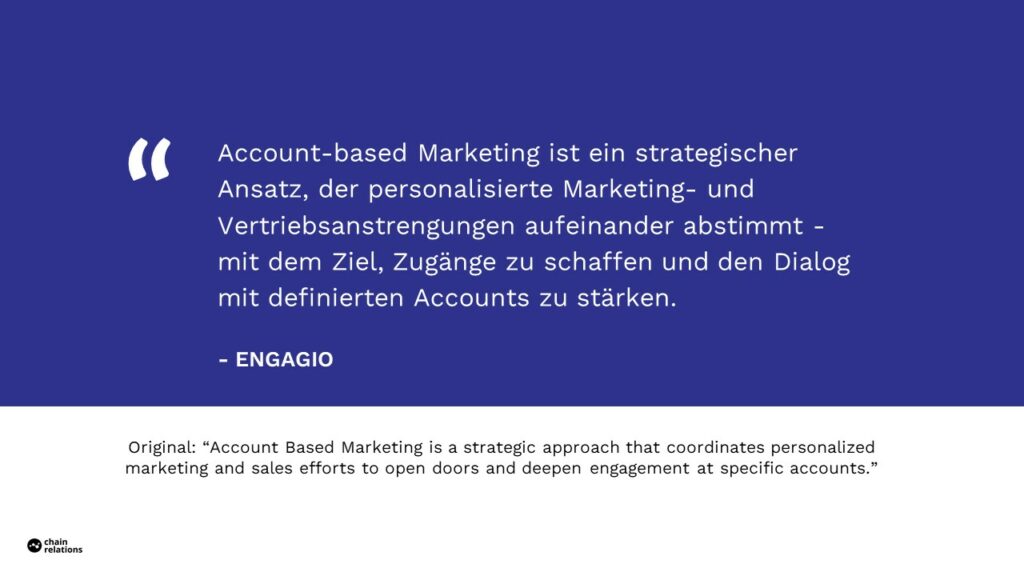
Diese 300 bis 400 Menschen mit Inbound Marketing zu bearbeiten, ist nicht effektiv. Wir wollen keine Registrierungen von Personen, die mit unserer überschaubaren Zielgruppe nichts zu tun haben. Und darauf zu setzen, dass die wenigen relevanten Entscheider den Weg zu uns aus eigenem Antrieb suchen, ist bei einem so exklusiven Kreis zu gewagt. In diesem Fall wäre stattdessen Account-based Marketing die bessere Wahl.
7. Inbound-Marketing-Strategie beschreibt Veränderungsprozess
In der Diskussion um Künstliche Intelligenz erleben wir gerade: Die Bereiche, in denen Menschen dem Computer überlegen bleiben können, sind die kreativen Aufgaben.
Kreativität heißt, dass wir neue Wege erkennen, Lösungen finden und Dinge in Frage stellen – und genau darum geht es auch beim Inbound Marketing. Schließlich müssen wir uns immer vor Augen führen: Wir simulieren mit Hilfe von Content Marketing und Prozessen die frühen Stufen des Vertriebsprozesses. Der Kunde will nicht mehr wie früher mit Verkäufer:innen reden – also kommunizieren wir mit unserer Zielgruppe über Inhalte.
Veränderung setzt bei den Menschen an
Der Erfolg unserer Leadgenerierung und -qualifizierung hängt nicht zuletzt von den Interaktionen mit Kolleg:innen im Unternehmen ab. Aus Sicht der Marketingabteilung betrifft Inbound Marketing vor allem fünf andere Bereiche:
- Vertrieb
- Pre-Sales
- Tele-Sales
- andere (nicht-digitale) Marketing-Bereiche wie Public Relations, Direkt-Marketing oder Eventmanagement
- Produktentwicklung bzw. Produktmanagement
Vertrieb
Im Inbound Marketing ist es die Aufgabe der Vertriebsabteilung qualifizierte Leads zu übernehmen, die sich in einem Entscheidungsprozess befinden. Die Sales-Mitarbeiter:innen sollen Input erhalten, der im Sinne von Sales Enablement beim Verkaufen hilft, und den Kunden zum Kauf befähigen (Buyer Enablement).
Die Realität ist leider: Das tun sie nicht unbedingt. Sie ignorieren unsere Leads oder vergessen sie einfach. Das ist nicht mal unbedingt böse Absicht. Aber sie haben ihr Leben lang anders gearbeitet. Und sie haben aus dem Marketing allzu oft keinen guten Input bekommen. Oder auch: Sie erhalten plötzlich mehr Leads, als sie verarbeiten können – vor allem dann, wenn es keinen zusätzlichen Tele-Sales gibt.
Die Zusammenarbeit muss sich also verändern. Dieser Veränderungsprozess ist unter dem Begriff Marketing & Sales Alignment bekannt.
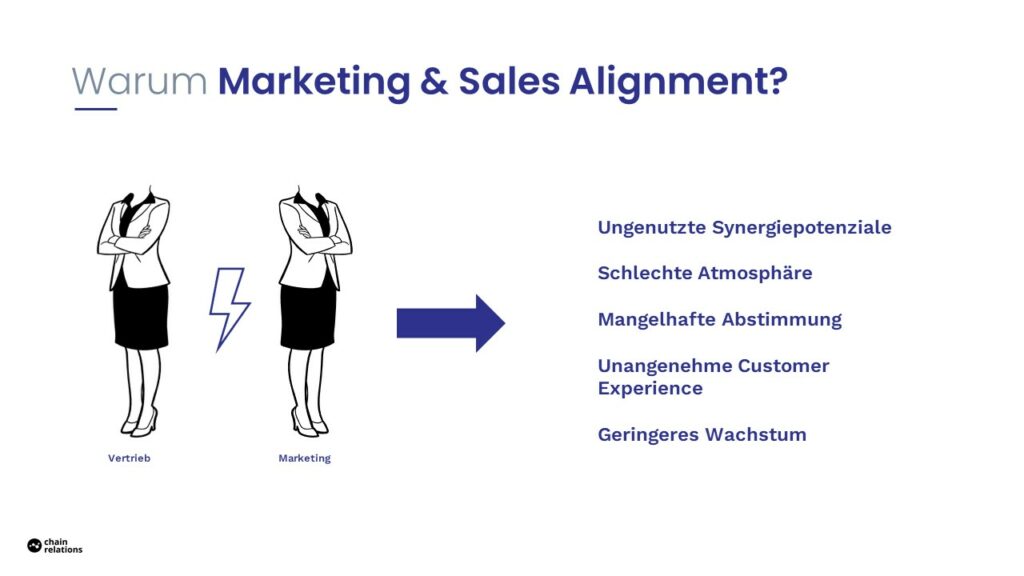
Pre-Sales
Im Pre-Sales finden Sie die wichtigsten Gesprächspartner:innen für die Content-Erstellung. Niemand kennt die Herausforderung eines Projekts oder einer Systemeinführung so gut wie diese technischen Vertriebskolleg*innen. Sie sind es gewohnt, über Herausforderungen, Fragen und Lösungsszenarien zu reden.
Sie sind die Expert:innen, die wir für die Erstellung von entscheidungsrelevantem Content interviewen, mit denen wir neue Themen planen und provokante Positionen entwickeln. Schließlich ist genau das ihre Aufgabe: Den Kunden bei seinen technischen Fragestellungen unterstützen.
Tele-Sales
Der Tele-Sales wird in der Inbound-Methodik vollkommen vergessen. Das ist eigentlich absurd, denn häufig sind Telesales-Mitarbeiter:innen die ersten Kontaktpersonen im Unternehmen.
- Sie gehen – bei einem bestimmten Lead-Score bzw. definierten Aktionen – aktiv auf den potenziellen Kunden zu.
- Häufig besteht schon ein Kontakt zu dem potenziellen Kunden. Möglicherweise war er z. B. schon auf einer Messe oder hat eine Demo angefragt.
Der Tele-Sales muss lernen, wie man mit digital generierten Leads umgeht. Schließlich muss er die Interaktionen des Kontakts auf der Website sowie mit dem Inbound Marketing interpretieren. Die Tele-Sales-Mitarbeiter:innen müssen also die neue Denkweise verstanden haben. Sie müssen „Leads lesen lernen“.
Andere Marketing-Bereiche
Inbound Marketing ist sehr umfassend. Immer dann, wenn andere Marketing-Bereiche am Ziel Lead-Generierung mitarbeiten, muss man die Aktivitäten aufeinander abstimmen. Zum Beispiel ist die Website für die Leadgenerierung zentral. Entsprechend ungünstig ist es, wenn eine andere Abteilung dafür zuständig ist.
Produktentwicklung/ Produktmanagement
Inbound Marketing kann einen Teil zum Gesamterlebnis mit einem Produkt beitragen. Dies gilt besonders für Software-as-a-Service-Angebote. Hier muss sich der Anbieter kontinuierlich darum kümmern, dass ein Kunde seinen Vertrag immer weiter verlängert bzw. nicht kündigt. Dazu muss das Anwenderunternehmen kontinuierlich vom Wert des Tools überzeugt sein.
Beim Inbound Marketing führen Sie also die Kommunikation vor dem Kauf weiter in die Phase der Produktnutzung.
